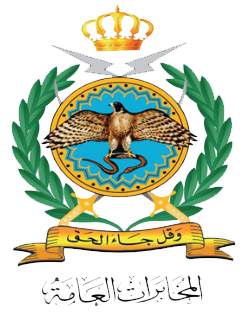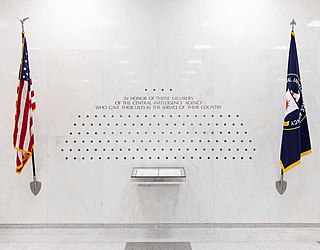Mukhābarāt, is the Arabic term for intelligence, as used by an intelligence agency. In most of the Middle East, the term is colloquially used in reference to secret police agents who spy on civilians. Organizations using the name include:

Ayad Allawi is an Iraqi politician. He served as the vice president of Iraq from 2014 to 2015 and 2016 to 2018. Previously he was interim prime minister of Iraq from 2004 to 2005 and the president of the Governing Council of Iraq in 2003.

The director of central intelligence (DCI) was the head of the American Central Intelligence Agency from 1946 to 2004, acting as the principal intelligence advisor to the president of the United States and the United States National Security Council, as well as the coordinator of intelligence activities among and between the various US intelligence agencies.

An Iraqi insurgency began shortly after the 2003 American invasion deposed longtime leader Saddam Hussein. It is considered to have lasted until the end of the Iraq War and U.S. withdrawal in 2011. It was followed by a renewed insurgency.
The General Security Directorate (GSD) was the intelligence agency of Iraq. Although details on its organisation were not made clear at the time, the General Security Directorate's designated mission was to "infiltrate and annihilate Iraq's tenacious insurgency".

The Badr Organization, previously known as the Badr Brigades or Badr Corps, is an Iraqi Shia Islamist political party and paramilitary organization headed by Hadi al-Amiri. The Badr Brigade, formed in 1982 and led by Iranian officers, served as the military arm of the Supreme Council for Islamic Revolution in Iraq (SCIRI), a Shia Islamic party based in Iran. The Badr Brigade was created by Iranian intelligence and Shia cleric Mohammad Baqir al-Hakim with the aim of fighting Saddam Hussein's regime during the Iran–Iraq War. Since the 2003 US-led invasion of Iraq most of the Badr Brigades' fighters have entered the new Iraqi army and police force. Politically, Badr Brigade and SCIRI were considered to be one party since 2003, but have now unofficially separated with the Badr Organization now an official Iraqi political party. Badr Brigade forces, and their Iranian commanders, have come to prominence in 2014 fighting the Islamic State of Iraq and the Levant (ISIL) in Iraq. It is a part of the Popular Mobilization Forces.
The Saddam–al-Qaeda conspiracy theory was based on false claims by the United States government alleging that a secretive relationship existed between Iraqi president Saddam Hussein and the Sunni pan-Islamist militant organization al-Qaeda between 1992 and 2003. The George W. Bush administration promoted it as a main rationale for invading Iraq in 2003.
The Iraqi Intelligence Service also known as the Mukhabarat, General Intelligence Directorate, or Party Intelligence, was an 8,000-man agency and the main state intelligence organization in Iraq under Saddam Hussein. The IIS was primarily concerned with international intelligence collection and analysis but also performed many activities inside Iraq in conjunction with the Directorate of General Security as a secret police organization.

The General Intelligence Service, often referred to as the Mukhabarat is an Egyptian intelligence agency responsible for providing national security intelligence, both domestically and internationally. The GIS is part of the Egyptian intelligence community, together with the Office of Military Intelligence Services and Reconnaissance and National Security Agency.

Jordanian General Intelligence Directorate, GID or Mukhabarat is the primary civilian foreign and domestic intelligence agency of the Hashemite Kingdom of Jordan. The GID is reportedly one of the most important and professional intelligence agencies in the Middle East; the agency has been instrumental in foiling several terrorist attacks both in Jordan and around the world.

The Central Intelligence Agency is a civilian foreign intelligence service of the federal government of the United States, officially tasked with gathering, processing, and analyzing national security information from around the world, primarily through the use of human intelligence (HUMINT) and conducting covert action through its Directorate of Operations. As a principal member of the United States Intelligence Community (IC), the CIA reports to the director of national intelligence and is primarily focused on providing intelligence for the president and Cabinet of the United States. Following the dissolution of the Office of Strategic Services (OSS) at the end of World War II, President Harry S. Truman created the Central Intelligence Group under the direction of a director of central intelligence by presidential directive on January 22, 1946, and this group was transformed into the Central Intelligence Agency by implementation of the National Security Act of 1947.
The Iraqi police system was re-established following the overthrow of Saddam Hussein in 2003.
The Directorate of General Security (DGS) also known as Internal State Security was a domestic Iraqi intelligence agency.
Mohammed Abdullah al-Shahwani is an Iraqi general and the former director of the Iraqi National Intelligence Service.
The cruise missiles strike on Iraq in June 1993 were ordered by U.S. President Bill Clinton as both a retaliation and a warning triggered by the attempted assassination by alleged Iraqi intelligence agents of former U.S. President George H. W. Bush while on a visit to Kuwait from 14–16 April 1993.
The United States (U.S.) Central Intelligence Agency (CIA) has been involved in covert actions and contingency planning in Iraq ever since the 1958 overthrow of the Iraqi monarchy, although the historiography of Iraq–United States relations prior to the 1980s is considered relatively underdeveloped, with the first in-depth academic studies being published in the 2010s.

The interrogation of Saddam Hussein began shortly after his capture by U.S. forces in December 2003, while the deposed president of Iraq was held at the Camp Cropper detention facility at Baghdad International Airport. Beginning in February 2004, the interrogation program, codenamed Operation Desert Spider, was controlled by Federal Bureau of Investigation (FBI) agents. Standard FBI FD-302 forms filed at the time were declassified and released in 2009 under a U.S. Freedom of Information Act request filed by the National Security Archive. Saddam, identified as "High Value Detainee #1" in the documents, was the subject of 20 "formal interviews" followed by five "casual conversations." Questioning covered the span of Saddam's political career, from 2003 when he was found hiding in a "spider hole" on a farm near his home town of Tikrit, back to his role in a failed 1959 coup attempt in Iraq, after which he had taken refuge in the very same place, one report noted.

The Institute for Intelligence and Special Operations, popularly known as Mossad, is the national intelligence agency of the State of Israel. It is one of the main entities in the Israeli Intelligence Community, along with Aman and Shin Bet.

The United States Central Intelligence Agency (CIA) dates from September 18, 1947, when President Harry S. Truman signed the National Security Act of 1947 into law. A major impetus that has been cited over the years for the creation of the CIA was the unforeseen attack on Pearl Harbor, but whatever Pearl Harbor's role, at the close of World War II government circles identified a need for a group to coordinate government intelligence efforts, and the Federal Bureau of Investigation (FBI), the State Department, the War Department, and even the Post Office were all jockeying for that new power.

Ali Salih al-Sa'di was an Iraqi politician. He was General Secretary of the Iraqi branch of the Baath Party from the late 1950s until the November 1963 Iraqi coup d'état. From February 8, 1963 until the November 1963 Iraqi coup d'état, he was Deputy Prime Minister under Ahmed Hassan al-Bakr, Minister of the Interior and as Commander of the National Guard.











